Peter MALONE
Saturday, 18 September 2021 19:19
Mr Belvedere Rings the Bell
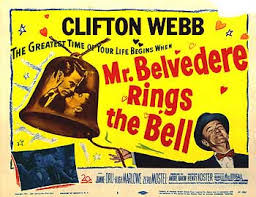
MR BELVEDERE RINGS THE BELL
US, 1951, 87 minutes, Colour.
Clifton Webb, Joanne Dru, Hugh Marlowe, Zero Mostel.
Directed by Henry Koster.
The third film to utilize the character of Lyn Belvedere, self-proclaimed genius, babysitter from the excellent domestic comedy Sitting Pretty, in the person of the acidic Clifton Webb. Mr Belvedere's character was so popular in the original that a sequel Mr Belvedere Goes to College was written and for this film a play called 'The Silver Whistle' was adapted to suit his character. It is quite entertaining American domestic comedy of 1950 with a special emphasis on the pathos of getting old as well as some optimism about feeling young. Joanne Drew is a most attractive heroine and Zero Mostel in an early role is the comic secretary-manager. Direction is by Henry Koster, a specialist in this kind of American domestic comedy.
1. The film as a Clifton Webb/Mr Belvedere vehicle? A sequel, comparisons with the original? The impact of Mr Belvedere's character, arrogant, vain? Likable yet disliked? His stories and their purpose? His imagination and living in a world of his own invention? A perfectionist? His lack of scruple in telling his stories and achieving them? The ironies of his character?
2. American domestic comedy 1950 style? Domestic situations, type, for example the Bishop, the Minister, the devoted Nurse, the old people, the pressurizing manager with an ulcer? The quality of the dialogue especially Mr Belvedere's wit and one-liners? A bit of spice to the comedy about old age? Sentiment?
3. Black and white photography, acts, the contrived atmosphere of the film and yet its basic entertainment?
4. The introduction to Mr Belvedere and his lecture tour, Emmett and his promotions? His lectures, Mr Belvedere's arrogance, his statements about not wanting to grow old after his encounter with the bickering elderly people? The encounter with the Bishop and his assuming the false identity with great aplomb? Introduction to the Reverend Watson, the meeting with Harriet and helping her, his taking over the meal table and telling stories, rousing the interest and the centre of attention? Mrs Hammond and her sardonic remarks? His treatment of Reverend Watson, trying to make him jealous with Harriet in the moonlight? Making people think young? The potion, the Tibetan stamps, the various ideas that he gave to the old people? Making them laugh? The picnic, the preparations for the bazaar, getting them going? How engaging was this kind of comedy especially with its focus on abandoned old people?
5. The presentation of the old people at the beginning of their moping, bickering, poverty, the derelict place? Mr Beeb and his lack of interests? The old man with no teeth, Mrs Hammond not getting any letters, the deaf old lady and her drinking, the twins? The meals, the angry exchanges? The humour in the presentation of old people?
6. Reverend Watson an the conventional good-willed minister but stuffy? Harriet and her obvious devotion, her clean uniform? The change in each? The fact that Reverend Watson knew Mr Belvedere's identity?
7. The comedy with Emmett and his ulcer, stealing the things for the bazaar, the court case?
8. The film's comment on journalists and their intrusion and ruining the old people's happiness? The claimants all coming back for their goods?
9. The effect of the disillusionment on the old people, their inability to cope, their being hurt like children, fearing that they wore made fun of? The quick reversal to old ways?
10. The change and Revered Watson learning from Mr Belvedere to achieve it? The final happiness?
11. A comedy fable of old age and Mr Belvedere declaring that he could face getting old when he say old people change so much?
Published in Movie Reviews
Published in
Movie Reviews
Tagged under
Saturday, 18 September 2021 19:19
Mr Kingstreet's War
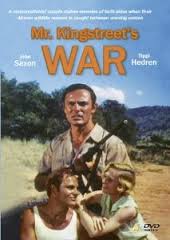
MR KINGSTREET'S WAR
1. The particular emphases of the title? On Kingstreet, on the nature of war? Indication of themes?
2. People's attitudes towards Kingstreet, as a saint, as playing God, as self-appointed? The love of his wife? What kind of person was he?
3. Audience attitude towards Kingstreet at the start, his violent pursuit of Morgan, his treatment of Morgan, his love for Mary, his work with the animals, a certain intensity and fanaticism? Could audiences identify with him as hero?
4. How surprising to discover that Morgan was his brother? The incident with the scissors and the flashbacks? The threat of cancer? Morgan saying that he was his brother's cross? The importance of the flashbacks in Spain and the effect on both men? Their going to Africa together? Their differing attitudes, protection of the animals, smuggling?
5. The importance of the war atmosphere? 1939? The European conflict transported to Africa? Kingstreet confronting the issues? The visit of the Italian colonel, his personality and style, his brashness and imperialism? The meal, his deal and his being attacked by Kingstreet? His vengeance in laying siege to the house, threatening Mary? The turning of the tables and the colonel's attitude? The details of the continuing war? Kingstreet's ambush, the fights? What was the purpose of Kingstreet's war against the Italians? For his work, the animals, for himself? Principles?
6. Comment on the fact that he treated the English in the same way? The contrast with the English approach and the Italian approach for getting his water? The irony of his blowing up the English armaments?
7. How well did the film present the world of the animals, the initial elephant hunt, the various details of animals? The waterholes? The need for Kingstreet to be neutral and independent to preserve this?
8. How convincing a person was Mary? How attractive, her marriage to Kingstreet and her love of him? Her role in his work, their relating? Her helping the natives? The threat by the Italian colonel and her turning of the tables? Her participation in the bombing of the Italian trucks? Her fears as the siege grew? Her helping Morgan? Her compassion for his cancer? How well delineated was her character? Could audiences identify with her?
9. What kind of man was Morgan? His relationship with his brother, his destruction of the plane, yet his final shooting and saving his brother?
10. The irony of Morgan's death, giving his life for his brother?
11. How well did the film build up to the final confrontation and fight? The pathos and suddenness of Mary's death? An appropriate ending?
12. How well did the film present World War Two, its comment on twentieth century wars and hostilities? Its themes of individuals in war, motivations, survival, heroics?
Published in Movie Reviews
Published in
Movie Reviews
Tagged under
Saturday, 18 September 2021 19:19
Mr Hobbs Takes a Vacation
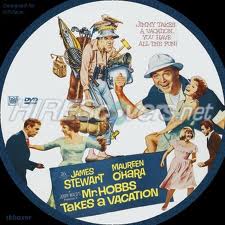
MR HOBBS TAKES A VACATION
US, 1962, 116 minutes, Colour.
James Stewart, Maureen O’ Hara, Fabian, John Saxon, Lauri Peters, Marie Wilson, Reginald Gardiner.
Directed by Henry Koster.
The first of three films that James Stewart made with director Henry Koster in the early sixties. Stewart had worked with Koster in the fifties with the comedy Harvey and the adaptation of Nevil Shute's No Highway in the Sky. The other two films in this trilogy are Take Her, She's Mine and Dear Brigitte.
The first two films were written by prolific screen writer-producer Nunnally Johnson. Each of the three films is popular family Americana of the early sixties - humorous, sentimental, affluent, brash and slightly superficial. Mr Hobbs is the most entertaining of the three and teams Stewart with Maureen O’ Hara. Take Her, She's Mine is the slightest and involves Stewart in an examination of the popular behaviour patterns with young teenagers in the early sixties. In Dear Brigitte the family is younger and Bill Mumy, a popular television youngster who later grew into an actor in such films as Bless the Beasts and Children and Sunshine, involves a youngster infatuated with Brigitte Bardot to whom he writes and the film ends with a visit to the famous actress. This time Glynnis Johns is the wife.
The films are light American froth but reflect the entertainment patterns of their time.
1. How enjoyable a comedy was this? How many laughs? the nature of the laughs? How much satire? how much humanity?
2. What was the quality of the humour in this film, the situation, the dialogue, characters, folksy and whimsical humour, family humour? What were the targets of the satire?
3. How American a film? The Hobbs family as typical Americans? Typical behaviour and relationships, to be laughed at? A picture of American society at work, holidays, attitudes? How optimistic a picture of American society did the film give? As compared to the society in other countries?
4. How typical American was Mr Hobbs? A typical James Stewart role? his niceness and naivety, old fashioned, loving? His ability to cope with children, maids, son-in-law? How good a father was he? His relationship to son and daughter, helping Katie at the dance, with Danny when they were lost? How good a man was Roger Hobbs?
5. How typical an American woman was Mrs. Hobbes? Maureen O’ Hara’s style, her support of Roger, her love, managing the family, helping Katie at the dance?
6. How typical a boy was Danny? Watching TV, his relationship with his father, their understanding one another in the fog, allowing Dad to watch TV with him? How did this compare with the relationship to Katie? Her worries about her teeth, boyfriends, her father paying someone to dance with her? The blossoming friendships? Susan and her family problems and the help given by the parents? Did they interfere too much or did they handle the situations well? How typical were these family relationships and problems?
7. How did Joe give a romantic touch to the film? Songs and glamour? Was this realistic? Did It add to the enjoyment of the film? The character of Byron and adding the same tone of romance?
8. How did this contrast with the Turners? The purpose of their introduction into the film? Comedy? The bird-watching, the long, walk for Mr Hobbs, the bathroom situation, the drinking? Was this good humour for this film?
9. How successful was the anecdote style of the film? Did it go on too long or was it just right and enjoyable?
10. How well did the film combine sentiment, heart-warming situations and pre-suppositions about family life and American society?
Published in Movie Reviews
Published in
Movie Reviews
Tagged under
Saturday, 18 September 2021 19:19
Mr Denning Drives North
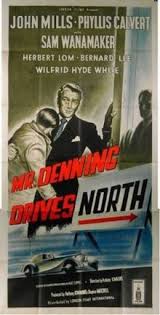
MR DENNING DRIVES NORTH
UK, 1955, 93 minutes, Black and White.
John Mills, Phyllis Calvert, Wilfrid Hyde White, Eileen Moore, Herbert Lom, Raymond Huntley, Sam Wanamaker.
Directed by Anthony Kimmins.
A briskly made, very British thriller. Directed by Anthony Kimmins, director of such films as Mine Own Execution and Smiley, the film's strength lies in John Mills' performance. The plot is very contrived and deliberately so - the audience becomes involved in the puzzle of a disappearing body and the responsibility of Mr Denning for the death, the recovery of the corpse.
Phyllis Calvert gives support to John Mills and there is a good supporting cast which includes Wilfrid Hyde White who causes some humorous moments. The screenplay is by Alec Coppel, author of a number of crime thrillers and especially of Moment to Moment (with Jean Seberg and Honor Blackman, directed by Mervyn Le Roy) which resembles this screenplay in some instances.
1. An interesting and entertaining murder thriller? Audience involvement in the mystery, the puzzle, the identification with the hero and his plight?
2. The conventions of the thriller genre? Crime, the body, investigations, court case? flow well were these handled? conventionally, better than average?
3. Black and white photography, English atmosphere? Musical score?
4. The structure of the film? Mr Denning and his anxieties, his explanation and the flashback to the crime, the involvement of the audience with his wife and the need for the discovery of the body, the continued puzzles, Chick and his investigations? The coincidences and Mr Denning finally facing up to the situation? His going off scot free? justice? The plausibility of the situation especially Mr Denning's work, his relationship with his wife, his daughter and the confrontation with the victim? The search? The court case? The
contrivances sufficient for this kind of thriller?
5. John Mills as Denning? his work, with planes, the importance of the dream sequence involving the characters and introducing us to the puzzle? His accountant and their clashes? The situation with the victim, hiding the body with all the coincidences especially the encounter with the police? The encounter with the gypsies, with the cemetery attendant etc.? The cover-up and whether he should have confessed to the police? His relationship to his wife and her support, his daughter, to Chick? his facing up to the truth at the
end?
6. Mrs Denning and her support of her husband, her collaborating with all his cover-up, the investigations? The searches for the body? her story about the gypsy and its consequences for the court case?
7. Chick and his legal ability, work with the firm, engagement to the daughter, his investigation and making his mark, the jibes at the American as regards the gypsy, his discovery of the truth, the hypotheses, the irony of the automobile association plate?
8. The minor characters and their contribution to the atmosphere the people at the plane works especially the accountant? The people at the inquest and the court case? The humour of the cemetery attendant, his recognition of the ring, his statement at the end especially about the photo? The gypsies and the collage of interrogations, Mrs. Smith, the deaf and dumb gypsy girl and her boy friend? The victim himself and his callous attitudes, the victims brother?
9. A satisfying thriller?
Published in Movie Reviews
Published in
Movie Reviews
Tagged under
Saturday, 18 September 2021 19:19
Mr Majestyk
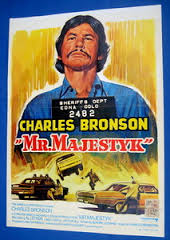
MR MAJESTYK
US, 1974, 103 minutes, Colour.
Charles Bronson, Al Lettieri, Linda Cristal, Lee Purcell, Paul Koslo.
Directed by Richard Fleischer.
Mr Majestyk is considered one of Charles Bronson’s best films. It has excellent credentials from director Richard Fleischer who had won an Oscar for best documentary in 1948, who had begun to direct small-budget films like The Narrow Margin in the 50s and graduated to Twenty Thousand Leagues Under the Sea. The 1960s for him were rather more spectacular with Barabbas and Doctor Dolittle. However, in the 1970s he directed a number of genre films including Soylent Green the year before Mr Majestyk. The film was also written by novelist Elmore Leonard, well known for his tough crime stories.
The film is about a melon farmer who wants to live in peace but is attacked by the Mob. As one commentator put it, the Mob doesn’t have a chance against Charles Bronson …
The film is well structured, has plenty of pace and action, and has a characteristic and good performance from Bronson himself.
1. Was this a good action film? What makes good action in a film like this?
2. How much did the film rely on the mystique of Charles Bronson? Bronson as hero? As the individual and the man who can succeed as private hero? Did the film use Bronson convincingly and successfully?
3. What picture of America in the seventies did the film give? Of the role of violence? The violence in the streets? The pressures on the individual? The organised criminals? Their use of guns? Revenge? How healthy an atmosphere?
4. The film's use of the Colorado fruit growing world? How interesting and convincing was this? The social overtones and implications of the film? Majestyk as a fruit grower? As independent? with the right of hiring his own men? The use of the immigrants? The illegal pressure from the unions? The use of the seasons and the need for the crops to be in? The police not understanding this? The suffering when Renda shoots the melons?
5. How sympathetic a character was Majestyk in himself? His sympathy for the migrants? His integrity before the police? The loner trying to save himself? The heroism in the response to the challenge? Was he a convincing and likeable character?
6. How interesting were the sequences of union pressures? emotional response? The plot of the migrants and their need for work? Crops suffering because of union reaction?
7. How sympathetic were the migrants? Their plight? Their support for Majestyk? The suffering and torture of his foreman? Nancy as strong-minded, as a supporter of Majestyk? Her help for him in his troubles, especially in the getaway? The contrast with Bobby Kopas? What motivated the thugs who pressurised the individual fruit growers?
8. How frustrating were the sequences with the settlers? Their inability to see Majestyk's point of view? Their lack of sympathy for him? Their use of the book against him? their disregard for his crops? Their grudging sympathy when he was being pursued? The impact of the shoot out in the streets? How repulsive was this?
9. How typical a villain was Frank Renda? His style in prison and lording it over others? The assumption that he was important? His pride in his killings? The fact that such an elaborate escape, that this could be done for him? With death for so many criminals and police? Was there anything sympathetic about his character? Why did Wiley support him? How criminal was she? Renda's associates, especially the lawyer? What picture of corruption did this give?
10. How interesting the contrast of character between Render and Majestyk? In the prison? In Majestyk’s taking the bus and keeping Render prisoner? In Majestyk’s manoeuvring to get Wiley? in the cat and mouse final chase? In the deaths? How was this central for the film?
11. How suspenseful the clash between Renda and Majestyk? What motivated Renda in his zeal for revenge? Was this his undoing? Why was he so consumed with hate? How resourceful was Majestyk? how much did he suffer during this period? did the police use him? The fact that they had him watched all the time to save him?
12. Comment on the styles of revenge? Renda, cruelty and inhumanity? Majestyk’s attempt not to take unnecessary life eg. Bobby?
13. How interesting and enjoyable for an action film were the final chase sequences? Majestyk’s tricking the car drivers and destroying them? The siege in the house and the tricks that he used? His sparing Bobby Kopas and Wiley?
14. How heroic was he meant to be? Not a mad killer? Having the right to live and survive against the criminals?
15. What values ware to the fore in this film? Were they consciously there in this thriller? Or were they implied in the nature of the thriller?
Published in Movie Reviews
Published in
Movie Reviews
Tagged under
Saturday, 18 September 2021 19:19
Mr Scoutmaster
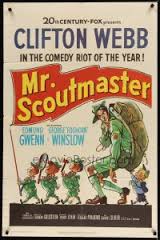
MR SCOUTMASTER
US, 1953, 87 minutes, Black and white.
Clifton Webb, George Winslow, Edmund Gwenn, Frances Dee.
Directed by Henry Levin.
One of several comedies made by Clifton Webb in the early fifties. A dancer, he made dramatic impact in Laura and The Razor's Edge. His comic skills were to the fore in Sitting Pretty and the Mr Belvedere films. In the early fifties he made a number of short American-style comedies including Elopement, Dream Boat. He teamed with Edmund Gwynn in For Heaven's Sake. This is a pleasant inconsequential, very patriotic American kind of comedy and is interesting for exhibiting the talents of Clifton Webb in his waspish and sardonic comic style.
1. An entertaining comedy? Its very American style?
2. The comic style of the fifties, black and white photography, the humorous score, a Clifton Webb vehicle? His particular style of comedy?
3. The atmosphere of the American city, American television in the fifties, advertising, ratings? American families, the church, the place of the Scouts? patriotism? The style of children growing up in this period?
4. The film's presentation of the Scouts, praising them, a tribute to them? The irony of kids being noisy and playing pranks? The sentiment and patriotism and heroism encouraged by the Scouts and its being exhibited in the search, at the end on the television programme?
5. The character of Robert Jordan? a Clifton Webb character? The initial impact of his severity yet the generous touch? His programme, advertising? His love for his wife and their not having any children? His generosity towards the Scouts, friendship with the Reverend Stone? The encounter with Mike and the scenes and discussions about the suit? His dislike for Mike and especially for his stories at the table?
6. Robert Jordan's trying to understand children? buying the comics and reading them? The discussion about Scouts with the Reverend Stone and his decision to be a Scoutmaster? The unlikeliness of success? The boys' reactions and their rudeness especially about his television show and its title? His coping? for example singing the National Anthem? Taking the boys on their hike and singing, the telling of stories around the camp fire, the search? The effect on the boys, the effect on him?
7. The character of Helen, their clash over the suit, over Mike? Helen's longing to have children, her looking after Mike? Her accusing Robert of not liking him? The effect on him in his search for Mike? The happy ending?
8. The Reverend Stone and his work for the Scouts, the church?
9. The character of Mike? small, the foghorn voice, his stories, the selling of the suit, the meal, his attending the meetings, his being dropped in the rain, the discovery of his true home, his going to the zoo and being bossed, his search for Robert Jordan and rescuing him, the reconciliation, the adoption and the final tribute? The sentiment in the presentation of this boy and his needs?
10. The scout meetings, the various tests and the humour about Jordan's visit to the home for the test, Vernon and his knowing all the answers (a junior version of Robert Jordan)?
11. The comedy routines? the supper during the test? The seriousness of the visit to Mike's home and the problems about his guardian?
12. An enjoyable piece of Americana? the presentation of attitudes in the fifties? Impact now?
Published in Movie Reviews
Published in
Movie Reviews
Tagged under
Saturday, 18 September 2021 19:19
Mr Ricco
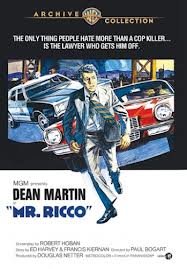
MR RICCO
US, 1975, 98 minutes, Colour.
Dean Martin, Eugene Roche, Thalmus Rasulala, Denise Nicholas, Cindy Williams, Geraldine Brooks, Philip Michael Thomas.
Directed by Paul Bogart.
Mr Ricco is a standard film from the mid-1970s, the material that one would find in many episodes of courtroom and police dramas on television. The film focuses on Joe Ricco (Dean Martin at his usual laidback style) as a San Francisco lawyer defending a young black man. However, he is also the target of an assassin.
San Francisco always looks good in this kind of film and there is a standard supporting cast of American character actors. It was directed by Paul Bogart who had a forty-year career in television and made the occasional film for cinema including Class of 44 and Torch Song Trilogy.
1. The quality of this film as a crime adventure? A minor crime adventure? A police thriller? The ingredients for popularity?
2. The excitement of the film, how taut was it, how slack in plot and resolution? The film as a Dean Martin vehicle and its consequences? success?
3. The authentic atmosphere of San Francisco and the way that it was used, Panavision and colour?
4. The character of Joe Ricco? How credible a person, Dean Martin's style and performance, qualities of character, ageing and tired, honest, caught within the letter of the law and the clash with public opinion? The way that he is liked by his staff and friends, his relationship with Katherine? His clash in his work with Cronyn? Held in suspicion by the blacks, by the police? Was he a credible character, able to be identified with? Sympathetic in his personality and his work and his attitudes?
5. The way that Joe Ricco was presented in his private life, the details of his family, especially his mother, his relationship with Katherine and the future that it held out?
6. How accurately presented was the black situation in San Francisco, racial pressures, the administration of justice, the loopholes of justice?
7. How interesting were the complex strands of the plot presented? As tied in with racial and legal issues?
8. The importance of the action sequences, as in the Church, the sense of danger for Ricco, the final action sequence at the reception?
9. How strongly drawn were the supporting characters, Frankie Steele, Irene Mapes? The police? Katherine?
10. The build-up to the reception, the mounting tension with the sniper, the deaths, especially Katherine's?
11. How expected was the final truth?
12. The value of this kind of social awareness thriller?
Published in Movie Reviews
Published in
Movie Reviews
Tagged under
Saturday, 18 September 2021 19:19
Mr Peabody and the Mermaid
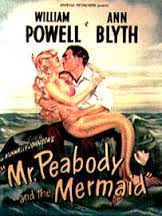
MR PEABODY AND THE MERMAID
US, 1948, 89 minutes, Black and white.
William Powell, Ann Blyth, Irene Hervey.
Directed by Irving Pichel.
Mr Peabody and the Mermaid is another film about mermaids – much better known is the British Miranda with Glynis Johns (and the sequel Mad About Men) and Daryl Hannah as the mermaid in Splash (with its sequel Splash, Too). This is a little fable from the late 40s about ageing, about masculine charm, about women responding to this charm. William Powell is the star, a veteran from the 1920s and especially the 30s with such films as the Thin Man series as well as The Great Ziegfeld. In the same year as this film he made the classic Life With Father. Ann Blyth is the lead – having emerged as Joan Crawford’s daughter in Mildred Pierce and soon to become a singing star in such films as The Great Caruso, The Student Prince and Rose Marie.
The film was directed by actor Irving Pichel who had been the off-screen voice of Jesus in the 1939 The Great Commandment and co-directed the 1954 biblical film, Day of Triumph.
1. How enjoyable a comedy from the forties? The impression of the dated style? The overall impact now?
2. For what audience was the film made?
3. The film as a fable? The moral of the story? The light touch in the moral?
4. Comedy about the human foible of not facing aging, not facing reality? The masculine myth of flirting and leering at younger women? The mermaid as the creation of this imagination?
5. The fantasy of the mermaid? Havable and yet not havable? Attractive and alluring though magic women? Yet the difficulties of keeping her?
6. The effect Of the structure of the film? The psychological overtones? The leading up to fantasy? The memories?
7. How credible was Arthur as the hero of the film? the initial impression, his memories, age, relationship with his wife, flirting? The atmosphere of the holiday? The creation of the mermaid? His encounter with her and reactions? The deep seated fantasies especially diving into the water at the end?
8. The mermaid herself? The difficulty of creating a character without speaking? How attractive? Her humour and petulance? The name that he gave her?
9. The contribution of the other characters especially Holly? The doctor, the guests at the hotel?
10. The significance of the ending? The facing of the truth. happy middle-aged people in their marriage? The irony of Lenore's hair clip?
Published in Movie Reviews
Published in
Movie Reviews
Tagged under
Saturday, 18 September 2021 19:19
Mr Skeffington
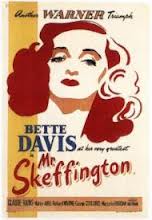
MR SKEFFINGTON
US, 1944, 145 minutes, Black and white.
Bette Davis, Claude Rains, Walter Abel, George Coulouris, Richard Waring.
Directed by Vincent Sherman.
Mr Skeffington was a popular novel of the period, by Elizabeth von Arnim. It was adapted for the screen by Julius J. Epstein, prolific writer at Warner Brothers including Casablanca.
The film was directed by Vincent Sherman, director of many films at Warner Brothers during the 1940s.
This was a big Bette Davis vehicle, a story which spanned the early part of the 20th century moving to World War Two. She portrays Fanny Trellis, a self-absorbed young woman who finds that her brother has embezzled money from the Skeffington Bank. When she confronts Jobe Skeffington, the owner of the bank, she decides that she will marry him. The film traces the marriage, the birth of their daughter. However, World War One intervenes and Fanny is left by herself in New York. As might be expected, she turns in on herself, associates with gangsters and other men. Eventually, Skeffington returns to the United States. At the same time, her daughter is grown up.
This is the material of popular novels, of soap operas. Bette Davis excels at this kind of role and was nominated for an Oscar. Claude Rains, a strong presence in many films of the period, was also nominated for an Oscar for best supporting actor.
1. The significance of the title yet the emphasis on Bette Davis, her memories as Mrs Skeffington?
2. The Warners Bros. production values of the forties? Black and white photography, sets, musical score? The effect on audiences at the time? Now?
3. The value of film soap-operas? The playing on emotions, the wide historical span, the presentation of America? The audience able to understand the period and its people, empathy with them? How valuable an experience?
4. The film as a Bette Davis vehicle? The qualities of her acting and her performance? As paired with Claude Rains and his impact?
5. The importance for structure for this kind of soap opera? The span of the years, the development of changes over the years? The audience and making the transitions of times? The pictorial view of America in these times? Fanny and Job changing over the decades?
6. The establishment of the nineteen fourteen period? Rumours of war, New York society and its chatter, Fanny's being the belle of New York? the ability of a wilful girl to be a star in New York? The background of swindles, wealth, rags to riches stories? Typical America? origins of families?
7. Fanny within this situation? Did she ever change? Her way of flirting, her treatment of her husband, taking the advise of George, her devotion to her brother, her fascination with Job and angling to marry him? The detailed meetings and leading him on? The significance of the marriage ceremony and the ferry ride back to the city?
8. Job as a contrast to Fanny? His entering the house, his wanting to marry her? Marrying the woman everyone else wanted? His wisdom, his business flair, devotion to Fanny? A woman is beautiful when she is loved? Did he change over the decades?
9. How well did the film portray the details of their life together? Anniversaries, Fanny in society? Her spending her life before the mirror? The birth of little Fanny, her fear of birth? Her disregard of people? Job and his involvement in the war?
10. The transition to the twenties and the couple growing older? Their style, wealth? The background of prohibition and gangsters? The lead up to the Wall Street crash?
11. Fanny and her whims, her going out with the gangster, her encountering Job and her shock at his infidelity? Her unreasonable demands for the divorce? Job's response and his reasons for infidelity? The impact of the divorce on him? The important sequence of himself and little Fanny at the restaurant discussing their future? Fanny's selfishness as regards her daughter?
12. The passing of the years and Fanny's inability to see her daughter? The years of concentrating on herself, dissipation? Her growing older and emptier? Fearful of growing old, the irony of the portrait? The irony of Johnny Mitchell proposing to her and the arrival of her daughter back? Mitchell’s indecision about young Fanny? Her realization about her growing older and her unwillingness to face it? How well did the film show the emptiness of her attitudes?
13 The trip on the yacht? the diphtheria and its effect on her? Old and ugly while she was ill? Her fascination with Job and remembering his works? Seeing him present? The visit to her psychiatrist, imposition on him? The wisdom of his direct attack on her?
14. The vanity in her testing her power to flirt? The men and their wives? Their reaction to her and her sensing it? The proposal for her money? Fanny leaving and going to marry Johnny Mitchell? The truth of the mother and daughter talks? Her inability to be a real mother?
15. What made Fanny finally admit the truth? The influence of George? Job’s return and its effect on her? The sentiment of their meeting? Job and his background of the concentration camp and his new life?
Published in Movie Reviews
Published in
Movie Reviews
Tagged under
Saturday, 18 September 2021 19:19
Mrs Pollifax Spy
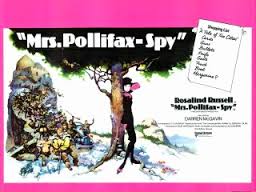
MRS POLLIFAX SPY
1. How enjoyable and entertaining a spy comedy? The status of espionage thrillers by 1970 after the long spate of James Bond stories in the sixties, the anti-spy films of the late sixties? The film as a Rosalind Russell vehicle?
2. How seriously was the plot to be taken, the issues? How much was comedy? American political attitudes round 1970? Patriotism, the C.I.A.? American influence in world politics? How have things changed since 1970?
3. The tone of the animated style of the comic credits? The farcical aspects of Mrs Pollifax as a spy? The world of Washington, of Latin America, of Albania? A serious look at the work of the C.I.A., exaggerated, how plausible?
4. Rosalind Russell and her style, her characterization of Mrs Pollifax? The dominant interview and her signing up? The irony of her being accepted and the nature of her assignment? Her enjoyment of it, partly as a holiday kind of activity? The dangers and her accepting of these?
5. The humour of her being kidnapped and tied to Farrell? Darren Mc Gavin and his tough style compared with that of Rosalind Russell? How effective a couple did they make? In espionage, survival?
6. The presentation of Albania, prisons, interrogation and torture? General Perdido and the more serious aspects of espionage and torture?
7. The portrait of Albania, audience response to Albania, communist countries? the humour of so many of the characters, their basic humanity (despite their ideology?), General Nexdhet and his regard for Mrs Pollifax, supplying her with information for her escape? Berisha and his liking Mrs Pollifax, the massage, the party? Lulash and his continued support and his escaping with them?
8. The attitude towards escape, Farrell and his being wounded? Mrs Pollifax, and her relentless preparations?
9. The C.I.A. personnel and their coping with the situation, their double-talk to Mrs Pollifax's relations?
10. The happy aspects of life in Albania, especially the party with its joy (as well as Mrs Pollifax's devices for escaping)?
11. How credible was the escape? In terms of excitement, in terms of use of intelligence, in the farm, travelling in the carts, on the river, the pursuit and the help of Lulash?
12. How successful was the mission? How successful was the film? Sheer entertainment, something substantial to say about human nature and America?
Published in Movie Reviews
Published in
Movie Reviews
Tagged under